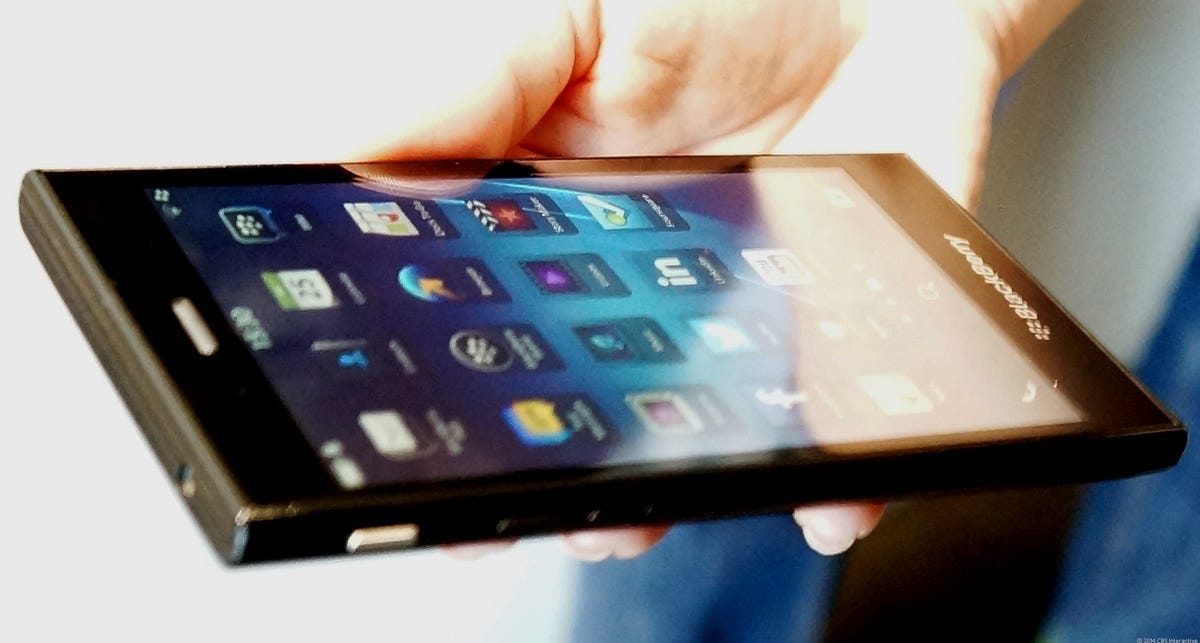BARCELONA, Spain — John Chen was at a recent charity event when an announcer unexpectedly called out his name and introduced him as the man who was taking over BlackBerry.
Almost immediately, several attendees pulled their BlackBerry Bolds and began holding them up. At that point, he realized he couldn’t keep sitting, and stood up and said a few words of encouragement and to keep the faith.
“There are some moments that are really great,” Chen told CNET in an interview. “This is why there’s quite a bit of good chance for us to turn this thing around.”
It will take the entire BlackBerry faithful — and then some — for the embattled company to turn itself around. The company took the first steps on Tuesday, introducing two new smartphones in the form of the budget-friendly BlackBerry Z3, which will retail for less than $200 and launch in April, and the “classic” BlackBerry Q20, which isn’t expected to hit the market until closer to the end of the year.
Chen teased more flagship phones to come in a press conference, but in a later interview with CNET, he offered a few more details. While the Q20 is the BlackBerry for its hardcore user base, the other flagship BlackBerry is intended to win over new customers. And there’s a strong chance it will launch this year, although he said he couldn’t guarantee it.
Sound familiar? Former BlackBerry CEO Thorsten Heins teased a year-end flagship to CNET almost a year ago, and that ended up being the BlackBerry Z30, a phablet that was quietly sold by Verizon Wireless and disappeared with few people noticing.
But Chen isn’t Heins. BlackBerry’s new CEO is a spitfire, quick with the jokes, and brutally honest — often to the dismay and horror of his PR handlers. He’s also not afraid to take on T-Mobile CEO John Legere, CNET’s most dangerous man in wireless.
Chen was his typically candid self in an interview with CNET, and managed to cover a wide range of topics.
Chen has said that his priority is to lock up the base of BlackBerry faithful. But that has meant creating a phone that longtime Bold-lovers will enjoy. As it turns out, simply throwing a keyboard on top of a BlackBerry 10 device isn’t enough.


Sarah Tew/CNET
So with the Q20, BlackBerry was bringing back the physical call, end call, menu, and back buttons, as well as a track pad. The updated BlackBerry 10 software will also include touches from the original BlackBerry software, including how the e-mail is handled, and the cut-and-paste function. The screen size will also be enlarged to 3.5 inches from 2.9 inches, he said.
Those little improvements should make for a better transition for customers still clinging to their old BlackBerrys, he said. With such a phone, those customers can start working right away, and slowly learn the gesture controls and other bells and whistles of BlackBerry 10, he added.
But for these BlackBerrys to have a chance to sell, they’ll need distribution. At the press conference, Chen alluded to his strengthening partnership with “two major US carriers,” a not-so veiled reference to AT&T and Verizon Wireless.
Chen elaborated further, noting that he had already talked to at least one of the carriers about the Q20, which was met with enthusiasm.
“I’ll be surprised if they don’t want it,” Chen said. “I’ll work hard to get them to want it.”


Brian Bennett/CNET
Chen said that one of the biggest mistakes of the previous regime was the inability to educate the market about the benefits of the BlackBerry 10. The company had a number of commercials and ads showing some of the features, as well as a high profile, but perplexing, Super Bowl commercial, but nothing was effective.
Chen said he wasn’t simply giving his phones to the carriers for sale to consumers. He said he would back the launches up with marketing dollars and hoped the carriers would provide additional support.
Without an educated sales force, consumers are left with the pure out-of-the-box experience, and Chen concedes it is complicated to start using the phone, particularly for a longtime BlackBerry user. Chen said that with the new BlackBerrys, he focused on the “out of the box” experience, and thinks about the opening minutes that a person has with one of his devices.
“It’s really about listening to the customer,” he said.
While that may win over some hardcore users, the questions are still up in the air whether any new customers would support BlackBerry.
Chen reiterated that he was attempting to stabilize the company and its financial condition, and that remained his priority. Ultimately, even with a savior phone, it’s all about being financially strong.
“Even if I get the iPhone, if they know I’m about to go out of business, they won’t buy the iPhone from me,” he said.
Lastly, Chen weighed in on the T-Mobile squabble, in which T-Mobile specifically targeted BlackBerry users in a promotion to switch. BlackBerry fans were quick to criticize Legere, and Chen added his own thoughts in a response.
While the two sides have made up (Chen says their respective chief marketing officers are talking), Chen and Legere haven’t met yet. Chen isn’t too worried.
“I guess after he and I connect on MySpace we’ll be fine,” he said.



